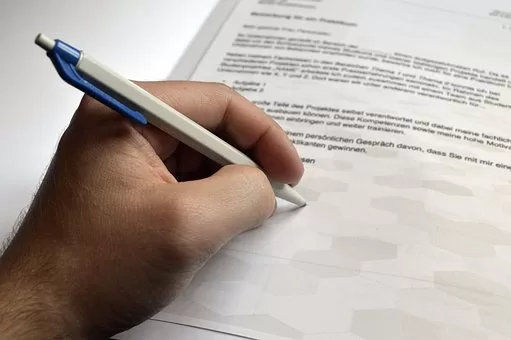Are you aspiring to pursue higher education abroad and seeking international scholarship opportunities? Congratulations, you’re taking a significant step toward your academic and career goals. Scholarships can ease the financial burden of studying abroad, but to secure one, you’ll need to navigate a process that demands careful planning and documentation.
In this guide, we’ll walk you through the essential materials required for a successful international scholarship application, tailored specifically for Nigerian students.

Here Are the Materials Needed for International Scholarship Opportunities:
To apply for scholarship abroad, you’ll need an academic transcript, proof of English proficiency, letter of recommendation, academic CV, statement of purpose, passport and passport photographs, and proof of financial need.
We explain each of these below:
1. Academic Transcripts and Certificates
Your academic performance is a crucial factor in scholarship applications. Most organizations require your high school or undergraduate transcripts and certificates. Ensure they are up-to-date and accurately reflect your achievements.
2. Proof of English Proficiency
If you’re applying for a scholarship in an English-speaking country, you’ll likely need to demonstrate your English language proficiency. Common tests like TOEFL or IELTS are widely accepted.
3. Letters of Recommendation
Secure strong letters of recommendation from teachers, professors, or professionals who can vouch for your academic abilities and character. These letters provide a glimpse into your personality and potential.
4. Curriculum Vitae (CV) or Resume
A well-structured CV or resume outlines your academic and extracurricular achievements, work experience, volunteer activities, and skills. Tailor it to highlight your strengths and relevance to the scholarship.
Speak with Inkdesk if you need help on writing an academic CV.
5. Statement of Purpose (SOP)

Your SOP is your chance to tell your story. Explain your academic and career goals, why you’re applying for the scholarship, and how it aligns with your aspirations. Make it personal and compelling.
| Note: we can also assist you in crafting a solid SOP.
6. Passport and Passport-Sized Photos
Ensure your passport is valid for the duration of your studies abroad. You’ll also need passport-sized photos for various application forms.
7. Proof of Financial Need
Many scholarships require evidence of your financial need. This might include bank statements, income certificates, or tax returns. Be honest and transparent about your financial situation.
Preparing for Standardized Tests
Standardized tests play a pivotal role in scholarship applications. Here’s what you need to know:
Register for Tests in Advance
Plan ahead and register for required standardized tests well in advance of application deadlines. Availability and test dates can vary.
Study and Practice
Devote time to studying and practicing for these exams. Consider taking preparatory courses or using online resources to improve your scores.
Take Mock Tests
Taking mock tests helps you get comfortable with the exam format and timing. It’s an excellent way to identify areas where you need improvement.
Submit Your Scores
Once you’ve taken the tests, ensure that your scores are reported to the scholarship providers. Keep records of your test results as you may need to submit them multiple times.
Seeking Scholarships and Opportunities
Now that you have your documents in order and your test scores in hand, it’s time to start searching for scholarship opportunities.
Research Scholarship Programs
Invest time in researching various scholarship programs. Look for those that match your field of study, level of education, and eligibility criteria.
Use Online Databases
Online databases like ScholarshipOwl, Scholarship.com, or the official websites of universities can help you find relevant opportunities.
Check Government Scholarships
Explore scholarship programs offered by the Nigerian government or the government of your chosen study destination. These often have specific criteria for eligibility.
Apply to Multiple Scholarships
Don’t put all your eggs in one basket. Apply to multiple scholarships to increase your chances of success. Each application may require different materials, so be organized.
Crafting an Impressive Application
Once you’ve identified scholarships you want to apply for, it’s time to craft an outstanding application.
Tailor Each Application
Customize your applications to fit the specific requirements of each scholarship. Highlight relevant achievements and experiences.
Pay Attention to Deadlines
Missing deadlines is a surefire way to jeopardize your chances. Keep a calendar of application deadlines and submit your materials well in advance.
Proofread and Edit
Your application materials should be error-free. Proofread your essays, SOP, and any other written documents meticulously.
Be Mindful of Interviews and Follow-ups
Some scholarships may require interviews or follow-up documentation.
Prepare for Interviews
If you’re invited for an interview, prepare thoroughly. Practice common interview questions and be ready to discuss your application.
Respond Promptly to Requests
If scholarship providers request additional information, respond promptly. This demonstrates your commitment to the scholarship.
Stay Persistent and Positive
Scholarship applications can be competitive, and rejection is a possibility. Here’s how to handle it:
Don’t Get Discouraged by Rejections
Rejections are part of the process. Use them as learning experiences and motivation to improve your future applications.
Seek Feedback
If you receive feedback on your application, take it seriously. Use constructive criticism to refine your approach.
Conclusion
Applying for international scholarships as a Nigerian student requires careful planning and the right materials. Remember, the process can be challenging, but with dedication and the right materials, you can increase your chances of securing that coveted scholarship.
Start early, stay organized, and put your best foot forward. Your dream of studying abroad can become a reality with the right preparation and materials at your disposal. Good luck on your scholarship journey!
